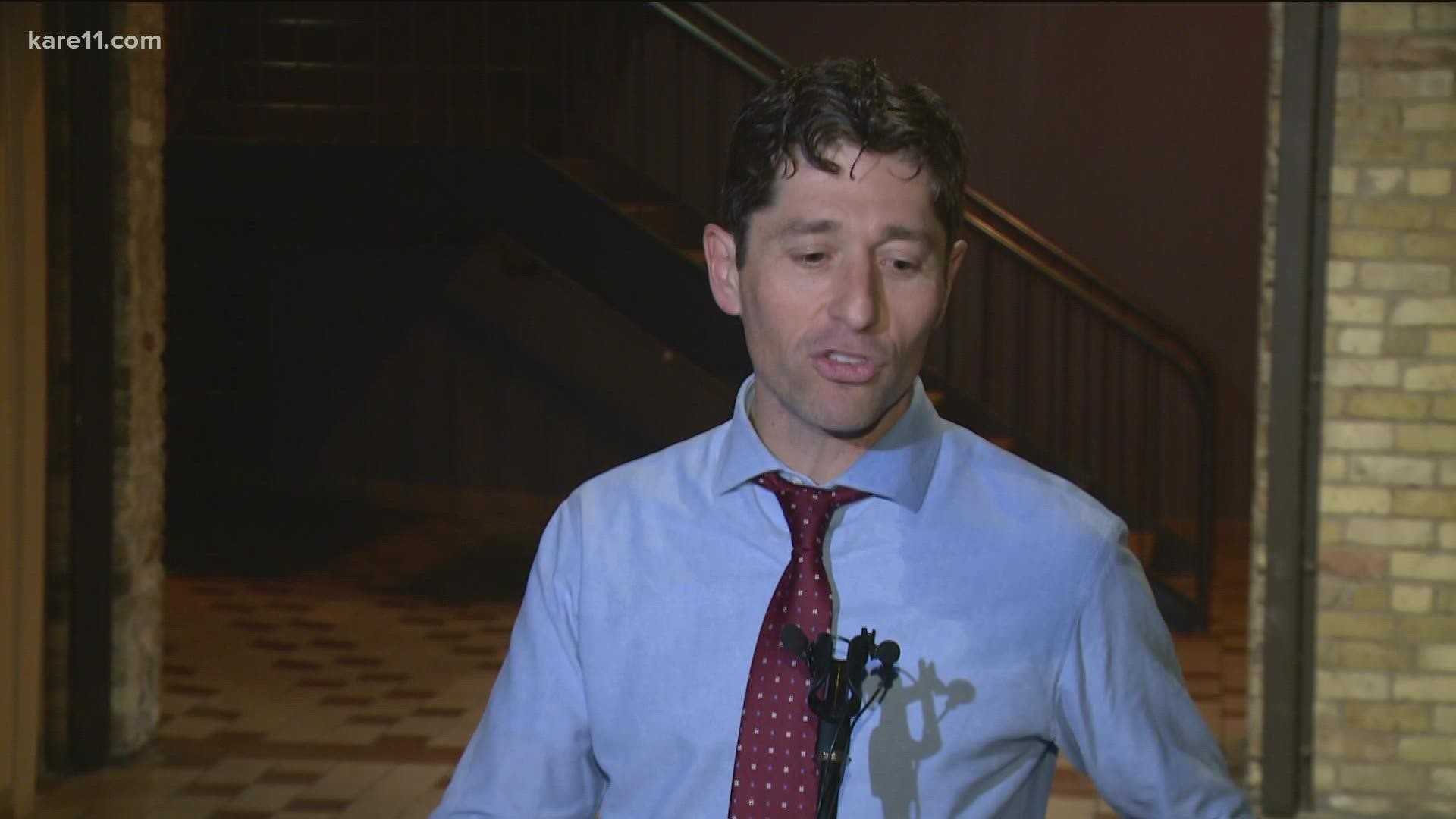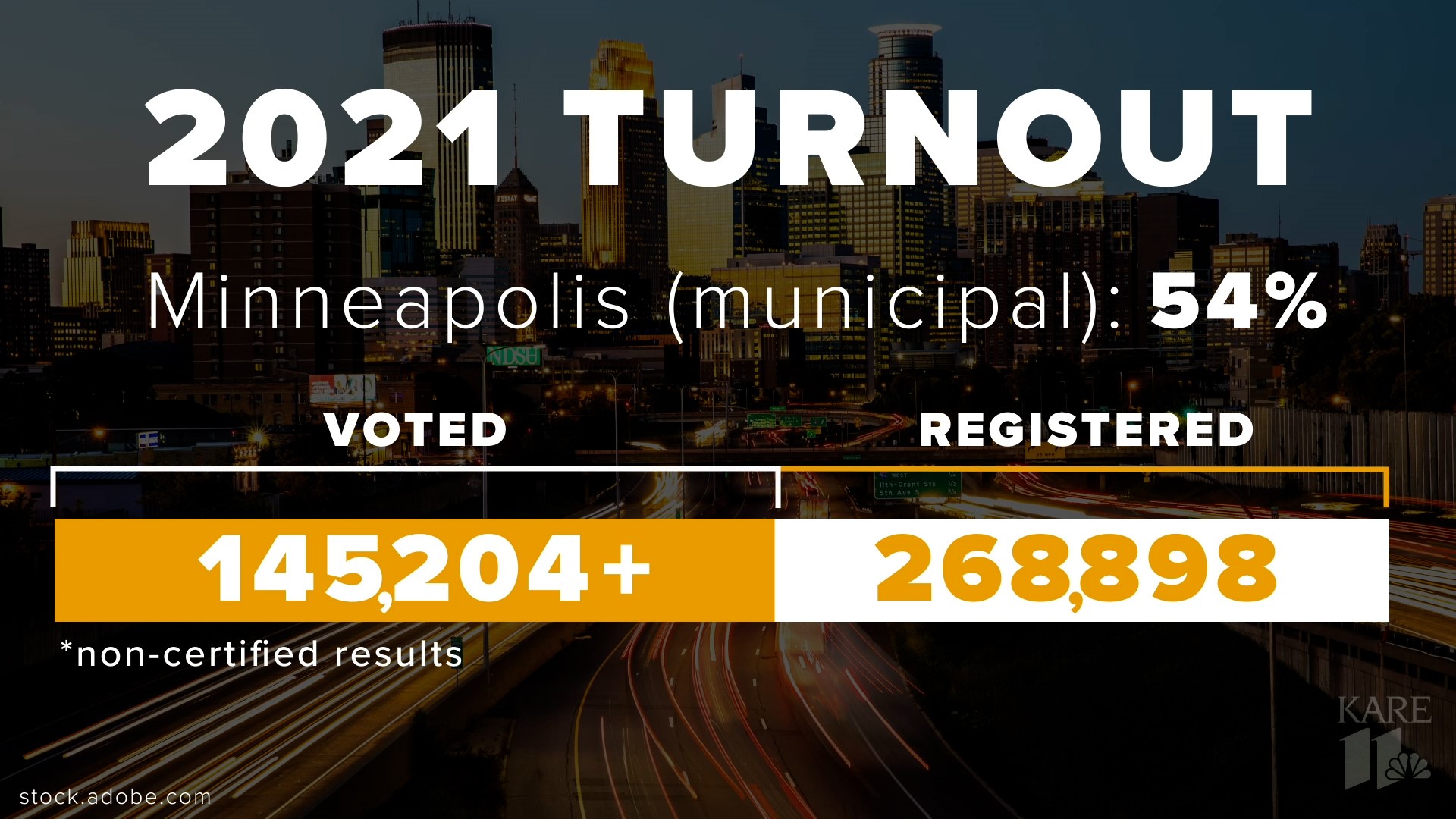MINNEAPOLIS — Late Tuesday night, as results trickled into his campaign's watch party in St. Anthony Main, Mayor Jacob Frey celebrated his apparent re-election as well as the failed effort to replace the Minneapolis Police Department with city Question 2.
"Thank you so much! Thank you, Minneapolis," Frey told the crowd on stage. "We are coming back!"
Minutes later, during an interview with reporters, Frey learned that city Question 1 — which sought to expand his power as mayor — had also passed with 52 percent of the vote.
"As of... and they're all reporting?" Frey asked, before a bystander confirmed the results. "Wow. So, I think that's actually the most important thing on the entire ballot."
Although Question 1 did not receive nearly the attention or influx of campaign money compared to Question 2, the measure will have far-reaching implications for city government in Minneapolis by making the mayor "chief executive" in the city charter. Under this new structure, sometimes referred to as the "strong- mayor system," the city council will play a legislative role without direct oversight of department heads.
Some fear the new system will strip power from the council and its diverse constituents.
Others, like Mayor Frey, say it will lead to more efficient government.
"It's a system of clarity," Frey said Tuesday night. "It allows us to get real and serious about the work ahead. It allows us to have a delineation between who's in charge of what, and I think that will also push back on a lot of the silly disagreements that we've seen over the last year and a half."
Previously, for every department except for police, the mayor and an executive committee of four city council members had the power to hire — or fire — the heads of those departments and could give them directions about how to perform their duties. Now, due to the passage of Question 1, the executive committee will be eliminated and the mayor will have complete oversight of departments like fire and public works.
Although the concept of the executive committee emerged in the 1980s, the initial power structure dates back a century ago to the creation of the city charter in 1920, and has long been a target of criticism. While running for re-election in 1947, Minneapolis Mayor Hubert H. Humphrey campaigned for charter reform, saying in June of that year "that for effective administration there must be a separation of powers between the executive, legislative and judicial branches... This is a sharing of responsibility and authority by the mayor and council."
"Hubert Humphrey in the late 1940s, Art Naftalin in the '60s, and Don Fraser in the '90s attempted to amend the charter to create a comprehensive charter. All of those efforts failed," said Jay Kiedrowski, a former Minneapolis budget director who pushed for the passage of Question 1. "So, yesterday was a very significant day in the history of Minneapolis."
Back when he served in city government, Kiedrowski said he encountered difficulties with the power dynamic, describing the common criticism of department heads having to report to "14 bosses." Former Mayor R.T. Rybak tweeted a similar sentiment just last week, and last December, the charter commission published a report claiming "the current structure lacks strong accountability, is overly complex and highly inefficient, and is significantly influenced by personalities of individual elected officials."
"What City Question 1 does, is it restructures the city, making the mayor the executive and the city council the legislative. This is patterned after St. Paul, Duluth, St. Cloud, San Diego, Denver, Seattle," Rybak said. "It's much more accountable and efficient."
But those feelings are certainly not unanimous in the city, particularly among some who have served as city council members in Minneapolis.
Robert Lilligren, who spent 12 years as vice president of the city council, said he has "a number of concerns" about the passage of Question 1.
"It's a radical change. A huge change in the way our government has worked," said Lilligren, a member of the White Earth Band of Ojibwe and the first tribal member ever elected in the city. "A lot of details are going to have to be worked out."
Like others who've criticized the charter amendment, Lilligren said he worries that too much power will be concentrated in the mayor's office, which he fears will drown out the voices of constituents in city council wards across Minneapolis.
"People from historically excluded communities have had real access to levers of powers, and I have concerns under this new system that it's going to be completely different," Lilligren said, "that the access will be limited."
Lilligren said he still has questions about how the so-called "strong-mayor system" will work for the next city council, which just saw five incumbents defeated and two open seats filled by new members.
"It's a tremendously diverse council politically, and also the most racially and ethnically diverse council we've ever elected in the city," Lilligren said. "I think it's interesting that, in the same year we elect the most racially and ethnically diverse council, we also limit that council's power and authority."
The council, however, will still retain some power over the city clerk, auditor and budget process.
The new structure will take effect Dec. 3.
On Wednesday, City Attorney Jim Rowader clarified that the passage of Question 1 will not disrupt the 2022 city budget process. He said it will "continue as planned against the current schedule that is in place, and any amendments to the adopted 2022 budget could be made if desired by the mayor and council later in 2022."


